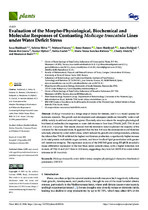Evaluation of the morpho-physiological, biochemical and molecular responses of contrasting medicago truncatula lines under water deficit stress

View/
Date
2021Author
Haddoudi, Loua
Hdira, Sabrine
Ludidi, Ndiko
Metadata
Show full item recordAbstract
Medicago truncatula is a forage crop of choice for farmers, and it is a model species for
molecular research. The growth and development and subsequent yields are limited by water availability mainly in arid and semi-arid regions. Our study aims to evaluate the morpho-physiological,
biochemical and molecular responses to water deficit stress in four lines (TN6.18, JA17, TN1.11 and
A10) of M. truncatula. The results showed that the treatment factor explained the majority of the
variation for the measured traits. It appeared that the line A10 was the most sensitive and therefore
adversely affected by water deficit stress, which reduced its growth and yield parameters, whereas
the tolerant line TN6.18 exhibited the highest root biomass production, a significantly higher increase
in its total protein and soluble sugar contents, and lower levels of lipid peroxidation with greater
cell membrane integrity. The expression analysis of the DREB1B gene using RT-qPCR revealed a
tissue-differential expression in the four lines under osmotic stress, with a higher induction rate
in roots of TN6.18 and JA17 than in A10 roots, suggesting a key role for DREB1B in water deficit
tolerance in M. truncatula.
